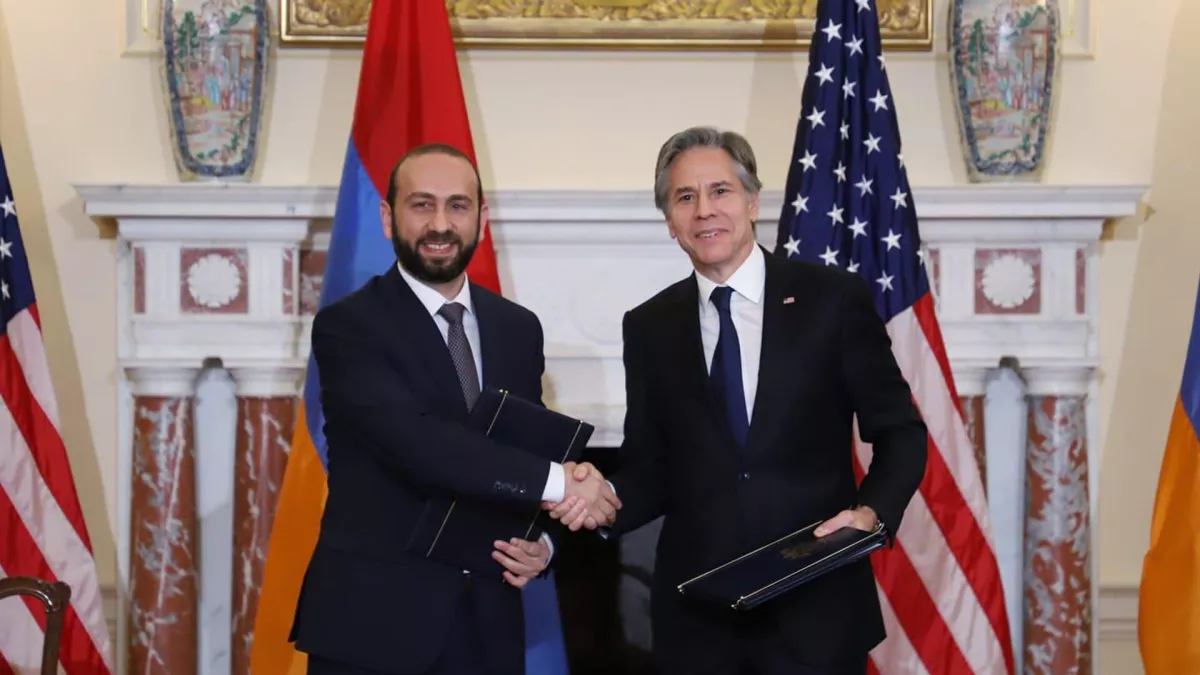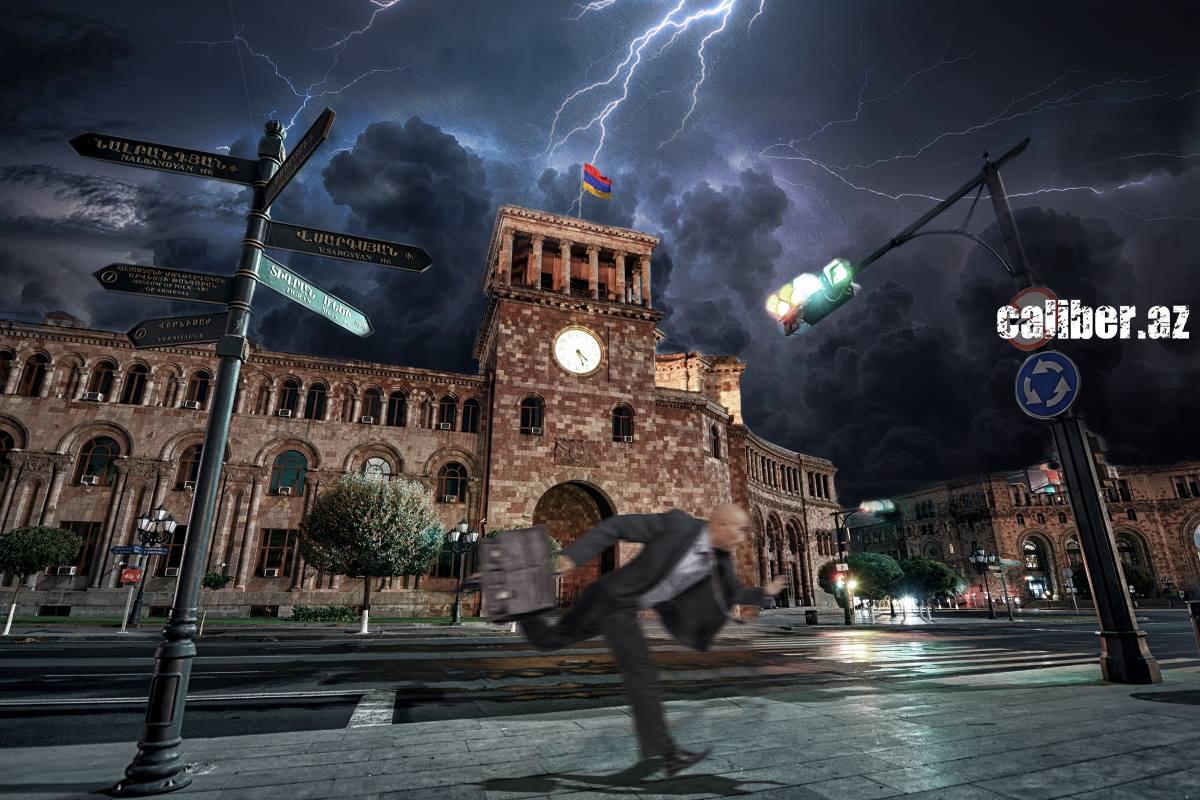What the US-Armenia Strategic Partnership Charter really means Biden’s “farewell kiss” to Armenia
Armenian media is abuzz, citing the signing of a Strategic Partnership Charter between the USA and Armenia, which has caused a storm of excitement on the Armenian political scene, where various statements by U.S. Secretary of State Antony Blinken are enthusiastically quoted. In particular, he mentioned the formation of a "Strategic Partnership Commission" aimed at exploring ways to strengthen ties in various areas, from defense to economy and democracy.
According to Blinken's clarification, the U.S. is " working with Armenia in the realm of security and defense, and in particular to support its efforts to assert its independence and sovereignty over its own territory." As a result, "We are increasingly strong partners,” a relationship Blinken asserts is not only beneficial to the two countries but also to "the region and beyond."
During his particularly talkative appearance on January 14, Blinken further pleased the Armenian political establishment by announcing that the U.S. would be sending a team of specialists to Armenia to provide expert assistance in strengthening border security. Additionally, Blinken highlighted that negotiations on civil nuclear cooperation are forthcoming. He also announced Armenia’s inclusion in the U.S.-led coalition against ISIS. In some circles, it is speculated that this announcement led certain parties to scale back their activities. Blinken went on to reaffirm the continuation of security cooperation, specifically in bolstering "peacekeeping capabilities," including joint exercises under the Eagle Partner program— as if these exercises hadn't taken place last summer.

In turn, pleased with the developments, Ararat Mirzoyan commented on the Charter’s creation as "a robust framework and injects greater ambition into our cooperation." In his view, this means "deepening defense and security cooperation," strengthening " economic and energy ties," and so on. He then repeated Blinken's talking points, adding only that Yerevan is"eager to continue working with the new United States administration."
The reason why Mirzoyan spoke of hope rather than certainty in this context likely doesn't require further explanation. As analysts have noted, the constant gestures of the Biden administration toward Yerevan have ultimately culminated in what can be described as a "strategic" kiss. But how will this be received, for example, in Tehran and Moscow? It’s important to recall that Russian and Collective Security Treaty Organization (CSTO) officials, ahead of the signing of the charter, emphasized Armenia’s "sovereign right to develop relations in all directions," while also stressing "the importance of our cooperation within the Eurasian Economic Union (EAEU)," solutions to "problems with neighbouring countries without seeking support from the EU and the U.S.," and adherence to the "principle of equal and indivisible security," which underscores the inadmissibility of "creating security threats for other states and international organisations."
In this context, some Armenian experts, even before the signing of the charter, sought to reassure the public by stating that "the U.S. will not provide Armenia with any security guarantees, military assistance, or sell or supply weapons and ammunition as aid," and that the document’s format would not include "the deployment of a U.S. military base or military representatives in Armenia." However, this raises a question: Isn't there a Pentagon representative in Armenia’s Ministry of Defence, who, interestingly, has been introduced by the U.S. embassy in Armenia as a "civilian advisor from the State Department"?
On the other hand, a day ago, Armenia's Minister of Economy, Gevorg Papoyan, informed that "Armenia is not thinking of replacing the EAEU with anything," merely "diversifying its trade partners." As he put it in a more convoluted manner (in the style of Nikol Pashinyan), "We want to be independent. And independence is when you depend on everyone, not just one, and everyone, to some extent, depends on you." So, there you go – the main thing is to depend on someone.
Meanwhile, on January 9, the Secretary of the Supreme National Security Council of Iran, Ali Akbar Ahmadian, during a meeting with Armenia's Prime Minister, emphasized that "the presence of non-regional forces complicates the achievement of peace and stability in the region," and that peace and stability are only possible with the help and cooperation of the countries in the region.

By the way, Armenian media are already focusing on Ararat Mirzoyan’s upcoming visit to Moscow, although they are quick to emphasize that the dates were set well in advance. Well, euphoria is euphoria. However, some voices within the Armenian discourse subtly point out that the U.S. signed a nearly identical charter with Georgia in 2009. The document also outlined plans for cooperation in defense and security to promote peace and stability. Furthermore, cooperation and partnership between the U.S. and Georgia in defense and security areas was described as beneficial for both countries and for the region—a phrase that sounds familiar, doesn’t it? Moreover, in 2016, the two countries signed a memorandum on deepening defense and security cooperation between Georgia and the U.S. Three years later, Georgia and the U.S. signed a framework agreement on security cooperation for a three-year period, which was extended for another 10 years in 2022.
In 2024, a statement by the Georgian public movement People's Power recorded that this "strategic partnership remains nothing but empty words," with "90% of so-called aid flowing through fake NGOs" to organizations and parties "that attempt to fuel polarization, dismantle state institutions, restore agentocracy, and spread pseudo-liberal ideology in Georgia." In mid-2024, the U.S. announced a review of its relations with Georgia in light of the country's adoption of the "Foreign Influence Transparency Law," and subsequently declared a suspension of $95 million in aid to the Georgian government. By the end of the year, the U.S. State Department announced the suspension of the strategic partnership with Georgia.
It is important to highlight that Azerbaijan currently holds a leadership position in the region, both politically and economically, as well as on the military front. The President of Azerbaijan, Ilham Aliyev, previously emphasized the significance of the outcomes of the Second Karabakh War and the subsequent anti-terrorist operation. He pointed out that Armenia should seriously consider these results, especially given the ongoing militarization within Armenia, which has become a new factor of threat for the South Caucasus. As the President underscored, Azerbaijan cannot afford to remain passive in the face of this situation.
Furthermore, President Aliyev noted that those who currently appear to support Armenia and encourage new provocations against Azerbaijan will most likely not stand by Armenia until the end. This, he explained, mirrors the situation in 2020 and the subsequent period, where such support faltered. The reason for this is not a matter of unwillingness, but rather because Azerbaijan will simply not allow it.








